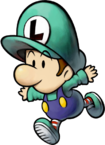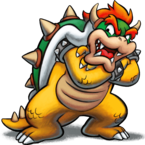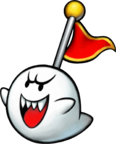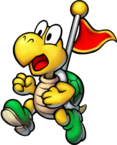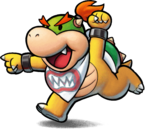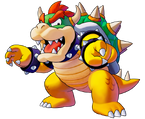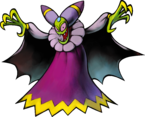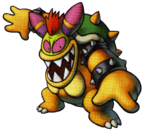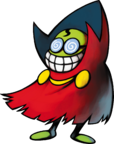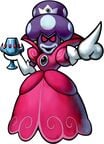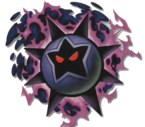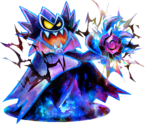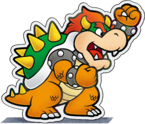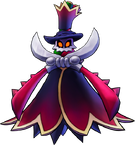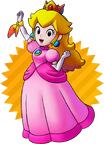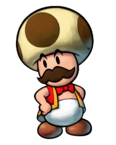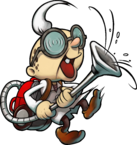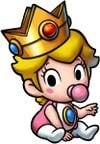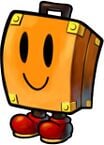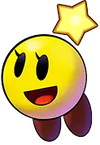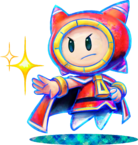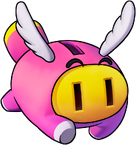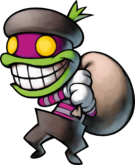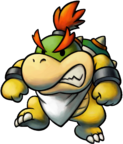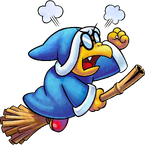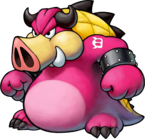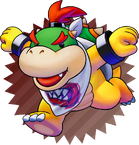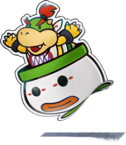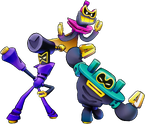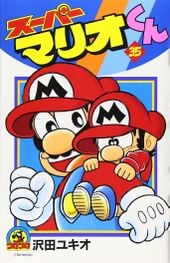Mario & Luigi (series): Difference between revisions
Jude da Dude (talk | contribs) No edit summary |
|||
| Line 466: | Line 466: | ||
===First five games=== | ===First five games=== | ||
*Bowser mimics the gameplay devices that Mario and Luigi employ in each game: | *Bowser mimics the gameplay devices that Mario and Luigi employ in each game: | ||
**As [[Rookie]], he develops his own Bros. Attacks with Popple in ''Superstar Saga''; | **As [[Rookie]], he develops his own Bros. Attacks with Popple in ''Superstar Saga''; | ||
| Line 484: | Line 483: | ||
===All six games=== | ===All six games=== | ||
*The storyline is about or heavily features collecting the pieces of a Star or another magic item: the [[Beanstar]] in ''Superstar Saga'', the [[Cobalt Star]] in ''Partners in Time'', the [[Star Cure]]/[[Miracle Cure]] in ''Bowser's Inside Story'', the [[Ultibed]] in ''Dream Team'', [[Fire Ore]] to build [[Papercraft|Papercraft Fire Mario]] in ''Paper Jam'' and the Bonds for Connie's [[Bonding Can]] in ''Brothership''. | |||
*Unique variants of common ''Super Mario'' enemies appear: ''Superstar Saga'' has bean-related enemies, ''Partners in Time'' has [[Shroob]]-like enemies, ''Bowser's Inside Story'' has Fawful-themed, body-themed and [[Dark Star]]-themed enemies, ''Dream Team'' has Antasma-themed and dream-themed enemies, ''Paper Jam'' has paper versions of enemies and ''Brothership'' has Glohm-affected enemies. | *Unique variants of common ''Super Mario'' enemies appear: ''Superstar Saga'' has bean-related enemies, ''Partners in Time'' has [[Shroob]]-like enemies, ''Bowser's Inside Story'' has Fawful-themed, body-themed and [[Dark Star]]-themed enemies, ''Dream Team'' has Antasma-themed and dream-themed enemies, ''Paper Jam'' has paper versions of enemies and ''Brothership'' has Glohm-affected enemies. | ||
*When enemies are defeated, they disappear either by fading away or in a small explosion whereas when bosses are defeated, they disappear in a large explosion. | *When enemies are defeated, they disappear either by fading away or in a small explosion whereas when bosses are defeated, they disappear in a large explosion. | ||
| Line 498: | Line 498: | ||
*The setting is largely somewhere other than the [[Mushroom Kingdom]] of the present: the [[Beanbean Kingdom]] in ''Superstar Saga'', the Mushroom Kingdom of the past in ''Partners in Time'', [[Bowser's body]] in ''Bowser's Inside Story'', [[Pi'illo Island]] and the [[Dream World]] in ''Dream Team'' and [[Concordia]] in ''Brothership''. | *The setting is largely somewhere other than the [[Mushroom Kingdom]] of the present: the [[Beanbean Kingdom]] in ''Superstar Saga'', the Mushroom Kingdom of the past in ''Partners in Time'', [[Bowser's body]] in ''Bowser's Inside Story'', [[Pi'illo Island]] and the [[Dream World]] in ''Dream Team'' and [[Concordia]] in ''Brothership''. | ||
*All games except for ''Paper Jam'' have battles that only one character takes part in, as well as having at least one battle that Mario has solo. | *All games except for ''Paper Jam'' have battles that only one character takes part in, as well as having at least one battle that Mario has solo. | ||
*All games except ''Partners in Time'' and ''Paper Jam'' have a late game quest where the bros have to revisit previous areas and collect pieces of an item to access a later area or dungeon. Superstar Saga has the Beanstar, Bowser's Inside Story has the Star Cures, Dream Team has the Ulti-Bed pieces and Brothership has the Bonds needed for the | *All games except ''Partners in Time'' and ''Paper Jam'' have a late game quest where the bros have to revisit previous areas and collect pieces of an item to access a later area or dungeon. Superstar Saga has the Beanstar, Bowser's Inside Story has the Star Cures, Dream Team has the Ulti-Bed pieces and Brothership has the Bonds needed for the Bonding Can. | ||
==Gallery== | ==Gallery== | ||
Revision as of 00:12, November 19, 2024
| Mario & Luigi | |
|---|---|
Logo design used from Mario & Luigi: Dream Team until Mario & Luigi: Bowser's Inside Story + Bowser Jr.'s Journey | |
| First installment | Mario & Luigi: Superstar Saga (2003) |
| Latest installment | Mario & Luigi: Brothership (2024) |
| Number of installments | 8 (6 direct, 2 remakes) |
| Franchise | Super Mario |
- “Nintendo's hilarious action-RPG proves that two heroes are better than one.”
- —Nintendo Power Volume 175, January 2004
Mario & Luigi, known in East Asia as Mario & Luigi RPG, is a series of role-playing video games originally developed by AlphaDream for Nintendo's handheld platforms since 2003. The series features games with long, detailed stories full of battles featuring Mario and Luigi as the titular characters. As in the Paper Mario series, the battle system emphasizes timing and elaborate attacks. Compared to other RPGs, the tone of the Mario & Luigi games is generally more whimsical and lighthearted, with various in-game jokes and comical references to the heritage of the Super Mario franchise.
AlphaDream developed each entry in the series from Mario & Luigi: Superstar Saga to Mario & Luigi: Bowser's Inside Story + Bowser Jr.'s Journey. Following the latter game's commercial failure, AlphaDream filed for bankruptcy in October 2019. Acquire succeeded AlphaDream as the developers of the series starting with Mario & Luigi: Brothership.
Gameplay
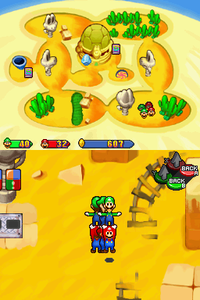
The gameplay of Mario & Luigi differs from most other role-playing games due to its focus on controlling Mario and Luigi simultaneously. During field sections, the directional pad controls Mario's movement with Luigi following closely, while Mario and Luigi's other actions are controlled individually with either of two lettered buttons: A for Mario, and B for Luigi. The game begins with them being able to jump independently, though they gain access to hammers and a variety of other techniques as the game progresses. For example, in Superstar Saga, Luigi's hammer can be used to squash Mario into a smaller size, allowing access to small gaps, while placing Mario on Luigi's shoulders allows them to act like a propeller and hover across large gaps. Some of these techniques are called Bros. Moves. Field gameplay has these skills used to surmount various obstacles, often in a platforming context such as to climb a mountain or activate switches to raise a bridge. Mario & Luigi is very lenient in field gameplay, with the only penalties for mistakes made in it being to drop the characters to a prior section or return them to the start of a room; damage is typically never inflicted through field gameplay. Along the way, the player can find blocks to hit to receive coins and items from. Various enemies roam the overworld, and coming into contact with these enemies initiates a battle. Landing a hit on the enemy while on the field allows the player to deal preemptive damage. Enemies can attack Mario or Luigi, which initiates a battle but does not deal damage. Should an enemy or their attack hit either character in the back, that character is stunned in the battle until their turn begins.
Battles in these games are turn-based. Mario and Luigi can attack normally either by jumping, which can deal multiple hits, though when used against enemies covered in flames or with spikes, Mario or Luigi will get hurt instead of the enemy; or with the hammer, which is powerful, but ineffective against flying enemies. Similar to other Super Mario RPG titles (Super Mario RPG: Legend of the Seven Stars and the Paper Mario series), players can time button presses to make their attacks more effective, such as earning an extra jump attack or increasing the hammer's power. Introduced in this series is the way in which Mario and Luigi can defend themselves during an enemy's attack. When an enemy attacks, the brothers will be able to either jump or use their hammer which, when successfully timed, allows them to dodge their attacks and even deal counter damage (for example: if they jump on top of a charging Goomba). Throughout the game, players can unlock Bros. Attacks, which use Bros. Points (BP) requiring players to cooperate between Mario and Luigi's actions to perform powerful combination attacks. Players can also use items such as the Super Mushroom for healing, peppers for boosting stats, and 1-Up Mushrooms for reviving fallen Bros. Defeating enemies earns experience points which help the Bros. level up and increase their stats, with players given the option to further increase the stats of one attribute every time they level up. Players can further improve their stats by equipping new gear to the Bros., or making them wear badges that give them special attributes.
In Bowser's Inside Story, Bowser becomes a playable character who is controlled on the top screen. The world inside Bowser's body, which is played with Mario and Luigi, is presented in a 2D side-scrolling style. The brothers sometimes must directly interact with Bowser in order for the player to progress, and have opportunities to visit the overworld via Warp Pipes as the plot advances. In battle, Bowser plays similarly to Mario and Luigi, but specializes in punching and breathing fire. He can inhale to suck up defenses and enemies from the top screen, similar to Kirby, a character from another Nintendo franchise. Any enemies inhaled will enter his body, where Mario and Luigi will fight them instead. Bowser earns new abilities by rescuing his caged minions, or by finding living kitten-like blocks called Blitties. Further, the Mario Bros. play various minigames where they help out Bowser from inside his body in order to progress: for example, the Arm Center, where the brothers hit spark-like items into a muscle to strengthen Bowser's arms; the Leg Outpost, where they stomp on leg muscles to strengthen Bowser's legs; and the Gut Check, where they help digest food that Bowser eats. One location, the Rump Command, has the player accumulate adrenaline in order to supersize Bowser if he is crushed, leading to a new battle system in which the DS is held vertically like a book and all attacks require the stylus and microphone.
Bowser's Inside Story also introduced a new ranking system in which, after a character has reached a specific level, his rank will increase. Upon reaching these milestones, that character will receive a special bonus, such as an additional equipment slot, being able to visit specific shops or receiving a certain piece of equipment. Mario and Luigi each have six ranks, but Bowser has four. The badge system from previous games has also changed, now possessing effects that Mario and Luigi can use by charging a meter with attacks. When the meter is filled, players can touch the meter to activate its effect, which varies depending on the combination of badges equipped, such as health recovery or stat raising.
Dream Team requires Mario to enter the world of Luigi's dreams to progress through the plot. Like Bowser's body in the previous game, this "Dream World" takes place in a 2-D side-scrolling environment, where Mario is joined by a "Dreamy" counterpart to Luigi. Throughout the Dream World stages, players will find various phenomenons called "Luiginary Works," into which Dreamy Luigi can embed himself to allow players to interact with the environment by touching the real-world Luigi on the touchscreen. For example, players can tweak Luigi's mustache to manipulate a Luigi-shaped tree to fling Mario to new areas with its branches, or make Luigi sneeze to create a gust of wind that blows blocks into the foreground. Mario can also take command of a stack of Luigis known as "Luiginoids," which takes on new abilities and forms as the game progresses, such as smashing through blocks, creating whirlwinds, and rolling down hills. Also in the Dream World, Mario can combine with Dreamy Luigi in battle and fight against large groups of enemies with assistance from the Luiginoids, which allow him to attack multiple enemies with successful attacks.
In Paper Jam, Paper Mario, which is the paper-like rendition of Mario seen in the Paper Mario series interpreted as a separate character, joins his normal counterpart and Luigi to form a team of three. He can use his paper thin body to perform his own unique actions, such as squeezing through tight gaps or turning into a paper airplane in battle to help the brothers. He can also use make copies of himself, allowing him to deal extra damage or attack multiple enemies at once, as well as use special techniques called "Trio Attacks" where he, the normal Mario, and Luigi attack together. There are also sections where players control giant papercraft versions of Mario, Luigi, Peach, and Yoshi to fight other papercraft enemies.
Games
Main series
| Title | |
|---|---|
| Cover, original release, and system | Synopsis |
| Mario & Luigi: Superstar Saga | |
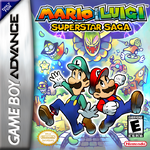 Game Boy Advance |
The first game in the series was Mario & Luigi: Superstar Saga, released in 2003 for Game Boy Advance. In the game, two new villains, Cackletta and Fawful, steal Princess Peach's voice. Mario and Luigi jump into the action and travel to the Beanbean Kingdom to stop them. It is later found out that Cackletta had stolen Peach's voice to awaken the Beanstar, a powerful star that can grant all wishes, such as letting Cackletta rule the world, that is awakened by a pure voice. Princess Peach happened to be the one with the "pure" voice.
The game was later released for the Wii U as a Virtual Console title on Nintendo eShop in 2014, and is included in Game Boy Advance - Nintendo Switch Online, released in 2023. |
| Mario & Luigi: Partners in Time | |
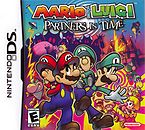 Nintendo DS |
A sequel to Mario & Luigi: Superstar Saga was released for Nintendo DS in 2005, called Mario & Luigi: Partners in Time. This game centers on the Mushroom Kingdom of the past, during the invasion of an alien race known as the Shroobs. Unaware of the danger, Princess Peach uses a time machine built by Professor E. Gadd to travel into the past, where she was promptly captured by the alien leader, Princess Shroob. Teaming up with Baby Mario and Baby Luigi, the adult Mario bros. set off to defeat the Shroobs and save Peach, using Time Holes created by the malfunctioning time machine to travel back and forth through time.
The game was later released for the Wii U as a Virtual Console title on Nintendo eShop in 2015. |
| Mario & Luigi: Bowser's Inside Story | |
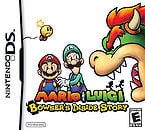 Nintendo DS |
The third installment, Mario & Luigi: Bowser's Inside Story, was announced at Nintendo's Fall Press Conference on October 2nd, 2008,[1] and released for Nintendo DS in 2009. While Mario and Luigi are still playable, Bowser also becomes a central protagonist in this game as he attempts to reclaim both the Mushroom and Koopa Kingdoms from Fawful, who used an outbreak of a disease known as the Blorbs as an opportunity to launch his own evil plot for world domination. Fawful later gives Bowser a Vacuum Mushroom, making Bowser inhale everything around him, including Mario, Luigi, Princess Peach, and other characters. |
| Mario & Luigi: Dream Team | |
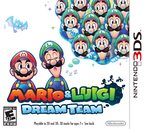 Nintendo 3DS |
The fourth installment, Mario & Luigi: Dream Team, was announced during February 2013's Nintendo Direct,[2] and released later in 2013, for Nintendo 3DS. Due to the shift to 3D, the game uses a new art style. In this game, Mario, Luigi, Princess Peach, and Toadsworth go on a trip to Pi'illo Island, where the bat king Antasma has turned many residents into stone, and kidnaps Peach. In order to save the Pi'illo Island folk and the princess, Mario must explore both the real, tridimensional world and the side-scrolling world in Luigi's dreams. |
| Mario & Luigi: Paper Jam | |
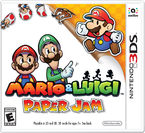 Nintendo 3DS |
The fifth installment, Mario & Luigi: Paper Jam, was announced during Nintendo's 2015 E3 Digital event. It was initially released later in 2015 for Nintendo 3DS, and features a crossover with the Paper Mario series. The story involves Luigi accidentally stumbling over a book and releasing characters from the Paper Mario series into the Mario & Luigi world. Bowser and Paper Bowser, despite some disagreements, decide to team up, combine their respective armies, and kidnap Peach and Paper Peach. Thus, Mario and Luigi team up with Paper Mario to rescue the princesses, as well as the Paper Toads. This is the first game in the series to be compatible with amiibo. |
| Mario & Luigi: Brothership | |
 November 7, 2024 Nintendo Switch |
The sixth installment, Mario & Luigi: Brothership, was released worldwide for Nintendo Switch on November 7, 2024. First announced during the June 2024 Nintendo Direct, it is the sixth original installment in the Mario & Luigi series, the eighth installment overall, and the first original Mario & Luigi game since Mario & Luigi: Paper Jam, released almost nine years prior. It is also the first Mario & Luigi title to be initially released on a home console, the first game in the series to feature Kevin Afghani voicing Mario and Luigi, and the first to use 3D models for all characters; most characters in previous games are 2D sprites. |
Remakes
| Title | |
|---|---|
| Cover, original release, and system | Description |
| Mario & Luigi: Superstar Saga + Bowser's Minions | |
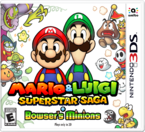 Nintendo 3DS |
Announced during a Nintendo Treehouse Live webcast at E3 2017, this remake of Mario & Luigi: Superstar Saga was released for Nintendo 3DS later in 2017. It features revamped and updated graphics akin to Mario & Luigi: Dream Team and Mario & Luigi: Paper Jam (including the use of additional lighting effects), as well as re-scored music. A previously untold storyline also exists in a new mode called Minion Quest: The Search for Bowser, where players control members of Bowser's army in efforts to reunite and rally his troops and find Bowser, in an adventure relying on new mechanics, with Captain Goomba leading the cause. The game features amiibo functionality, tied to figurines of three enemies of the Mario Bros.: Goomba, Boo, and Koopa Troopa. |
| Mario & Luigi: Bowser's Inside Story + Bowser Jr.'s Journey | |
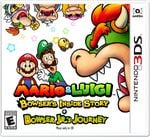 Nintendo 3DS |
Announced during the March 2018 Nintendo Direct, this remake of Mario & Luigi: Bowser's Inside Story was released for Nintendo 3DS, initially later in 2018. Like Mario & Luigi: Superstar Saga + Bowser's Minions, it features revamped and updated graphics and music, adds in many of the improvements introduced in Mario & Luigi: Dream Team, and features a previously untold story/mode where players control Bowser Jr. on his own adventure, where he sets off to find a cure to the blorbs.[3]
This would be both the last Mario & Luigi game to be developed by AlphaDream, which shut down in October 2019, and the last Mario & Luigi game to feature Charles Martinet's voice work before it was announced that he had moved to the role of Mario Ambassador. |
Miscellaneous
To promote Mario & Luigi: Superstar Saga + Bowser's Minions, a trivia game was released on the Play Nintendo website called Mario & Luigi: Superstar Saga + Bowser's Minions Trivia.
Characters
Major protagonists
| Character | ||
|---|---|---|
| Image | Brief biography | First Mario & Luigi appearance in role |
| Mario | ||
| Mario, with his brother, as the series name suggests, is the star of the series. When there is trouble, Mario attempts to solve the problem as quickly as he can, dragging Luigi alongside him. In this series, Mario is a very famous and popular hero, being well-known in various lands. As in the majority of Super Mario games, Mario is a silent protagonist, but he communicates by body movements and speaking in Italian-sounding gibberish. | ||
| Luigi | ||
| Luigi is Mario's younger, lesser-known brother. He often gets dragged into adventures beyond his will. Luigi is more cowardly and more hesitant than Mario, but he is willing to help solve any trouble that has arisen. Luigi's clumsy antics are usually comic relief, but it can be sometimes dangerous, including when he left Baby Luigi alone to Petey Piranha in Mario & Luigi: Partners in Time. As in the majority of Super Mario games, Luigi does not speak either in this game, communicating similarly to Mario; only in Dream Team do Luigi's thoughts take the form of words, and this happens only in Dream's Deep and whenever he becomes a giant. | ||
| Baby Mario | ||
| Mario and Luigi encounter Baby Mario and Baby Luigi in their adventures in Mario & Luigi: Partners in Time. Similar to Mario, Baby Mario often jumps ahead when a problem rises. Baby Mario is impulsive at times, unlike Mario, including when he uses his hammer in misbehavior. | ||
| Baby Luigi | ||
| Much like Luigi, Baby Luigi is a more timid brother than Baby Mario. In Mario & Luigi: Partners in Time, he is easily frightened, and he frequently cries in troublesome situations. Baby Luigi has shown to be key to destroying the Shroobs in Mario & Luigi: Partners in Time when he reverted characters to normal with his tears. He is also shown to know that an object has bad vibes, such as crying at the Cobalt Star because it contains the Elder Princess Shroob inside it. | ||
| Bowser | ||
| Bowser is on the protagonist side in Mario & Luigi: Superstar Saga and Mario & Luigi: Bowser's Inside Story. Unlike in most Super Mario games, Bowser aided Mario and Luigi in reaching the Beanbean Kingdom in Mario & Luigi: Superstar Saga, but after the crash landing, Bowser unintentionally became a rival, being used first by Popple as a minion and then by Cackletta as a body to possess. Bowser is the main protagonist in Mario & Luigi: Bowser's Inside Story, with Mario and Luigi adventuring inside him after he inhales the Vacuum Mushroom. | ||
| Paper Mario | ||
| Originally from the Paper Mario series, Paper Mario is introduced to Mario and Luigi when Luigi tips over a book and releases the Paper Mario characters into their world. Paper Mario is one of them, and he immediately helps Mario and Luigi defeat some Paper Goombas, and the three team up to rescue Paper Toads, stop Bowser and Paper Bowser, and rescue Peach and Paper Peach. Paper Mario can create copies of himself to mitigate his low HP and attack multiple times at once. When dodging, when he jumps, he can float briefly. Paper Mario and the Mario Bros. are needed when performing Trio Attacks, and they also partake in Papercraft battles. | ||
| Captain Goomba | ||
| Captain Goomba is the main protagonist of the Minion Quest: The Search for Bowser story mode from Mario & Luigi: Superstar Saga + Bowser's Minions, the 3DS remake of the original GBA game that started off the series. After the Mario Bros beat him and Private Goomp and the Koopa Cruiser crashes in the Beanbean Kingdom, the young Goomba wakes up in a cave and after some adventuring, he comes across a small group of his brethren, and after a comical reunion, they name him the captain of their squad. Although they do this because no one else wants to and they have no respect for Captain Goomba, the captain all but takes off from there as he turns into the leader the army needs and rallies the army back to rescue Bowser. | ||
| Captain Shy Guy | ||
| Captain Shy Guy is a deuteragonist of the Minion Quest: The Search for Bowser story mode from Mario & Luigi: Superstar Saga + Bowser's Minions. He is the second captain after Captain Goomba, and joins him in Beanbean Fields after mistaking him for Fawful's minions. Being a Shy Guy, he is often quiet and can be very embarrased easily, as shown during the Cutie Battle Contest. | ||
| Captain Boo | ||
| Captain Boo is a deuteragonist of the Minion Quest: The Search for Bowser story mode from Mario & Luigi: Superstar Saga + Bowser's Minions. He is the third captain, and joins Captain Goomba in Chucklehuck Woods, although he only wanted a flag to help block the sunlight but took on his role as a captain anyway. Out of all the captains, Captain Boo appears to possess the most amount of common sense. | ||
| Captain Koopa Troopa | ||
| Captain Koopa Troopa is a deuteragonist of the Minion Quest: The Search for Bowser story mode from Mario & Luigi: Superstar Saga + Bowser's Minions. He is the last captain, and joins Captain Goomba in Teehee Valley. He often speaks in rhymes which is often followed by the sound of wind, and is often ignored when doing so. | ||
| Bowser Jr. | ||
| Bowser Jr. appears as the main character of Bowser Jr.'s Journey in Mario & Luigi: Bowser's Inside Story + Bowser Jr.'s Journey. He and the Koopalings go out to find the ingredients for the Skeletone Formula:D, so that Bowser Jr. can impress his dad. However, his selfish nature causes problems for everyone around him, and when the Best Fitness Friends begin to attack the Koopalings, Bowser Jr. has to start taking things seriously and rescue the minions. | ||
Major antagonists
| Character | ||
|---|---|---|
| Image | Brief biography | First Mario & Luigi appearance in role |
| Bowser | ||
| Bowser is the final boss of Mario & Luigi: Partners in Time, one of the main antagonists of Mario & Luigi: Dream Team, and one of the main antagonists of Mario & Luigi: Paper Jam (alongside Paper Bowser). In Mario & Luigi: Partners in Time, Bowser is mainly an antagonist, teaming up with Baby Bowser to fight Mario and causing trouble by kidnapping 'Princess Peach' (later revealed to be a disguised Princess Shroob). He is manipulated once again when he is turned into Shrowser by the Elder Princess Shroob. In Mario & Luigi: Dream Team, Bowser allies with Antasma to take advantage of the Dream Stone's wish granting powers. In Mario & Luigi: Paper Jam, Bowser teams up with his paper counterpart to further his plans to take over the Mushroom Kingdom. In Mario & Luigi: Brothership, Bowser winds up in Concordia with his minions and attempts to fight against Zokket while still hindering Mario and Luigi. | ||
| Cackletta | ||
| Cackletta is the main antagonist in Mario & Luigi: Superstar Saga. She and Fawful had stolen Princess Peach's voice. She has also caused trouble in Beanbean Kingdom by transforming Queen Bean into a giant beast and stealing the Beanstar. After Mario and Luigi defeated her, Fawful took her soul and placed it into Bowser's body, transforming Bowser into Bowletta. | ||
| Bowletta | ||
| Bowletta is the form Bowser takes after being possessed by Cackletta, and is the final boss in Mario & Luigi: Superstar Saga. Bowletta kidnaps Princess Peach and demands Mario and Luigi to find all of the shattered pieces of the Beanstar and bring them to her in exchange of releasing Peach (although it is implied she was lying about this). After she loses Peach and the Beanstar however, she uses Bowser's Castle to attack the Beanbean Kingdom, at which point Mario and Luigi go and defeat her for good by destroying her heart, and releasing Bowser from Cackletta's control in the process. | ||
| Fawful | ||
| Fawful is Cackletta's servant. He speaks in Engrish and uses many food-related metaphors. In Mario & Luigi: Superstar Saga, he steals Princess Peach's voice and helps transfer Cackletta into Bowser. In Mario & Luigi: Partners in Time, Fawful plays more of a supporting role. He runs an underground badge shop the Baby Mario Bros. can access. Fawful plays as the main antagonist in Mario & Luigi: Bowser's Inside Story. He has usurped Bowser's Castle while creating an outbreak of Blorbs. He has also given Bowser the Vacuum Mushroom to aid him in his plot to rule Mushroom Kingdom. | ||
| Shroobs | ||
| The Shroobs are an alien race that has invaded Mushroom Kingdom in the past. They have trapped Toads and extracted their vim to power their technology. They can shoot bolts transforming characters into Shroob Mushrooms. The Shroobs speak a foreign language. One of the Shroobs major weakness is baby tears. Several Shroobs were also frozen in a preservation chamber in Bowser's Castle as shown in Mario & Luigi: Bowser's Inside Story, where three of them are fought as an optional boss. | ||
| Princess Shroob | ||
| Princess Shroob commands the Shroob fleet during most of Mario & Luigi: Partners in Time, and is thus the game's main antagonist. When Princess Peach has traveled to the past, Princess Shroob manages to capture her, but not without Peach trapping the Elder Princess Shroob - the real leader of the shoobs - in the Cobalt Star. It is only after Princess Shroob is mortally wounded in battle that this is revealed, however. | ||
| Elder Princess Shroob | ||
| Elder Princess Shroob is the older sister of Princess Shroob from Mario & Luigi: Partners in Time, she was trapped in the Cobalt Star by Peach and the bros and babies collected Cobalt Star Shards thinking the star could destroy the Shroobs. But it freed the Elder Princess Shroob who promised to kill the bros for her sister's recent death. | ||
| Dark Star | ||
| The Dark Star is the ultimate antagonist of Mario & Luigi: Bowser's Inside Story. It was put in the Toad Town Caves so that nobody would be able to use its power. However, Fawful steals it, and uses Peach to awaken the Dark Star so he can absorb its power. Once the Dark Star awakes, it goes inside Bowser's body, and steals his DNA to become Dark Bowser. | ||
| Antasma | ||
| Antasma is a bat king and one of the antagonists of Mario & Luigi: Dream Team. He is behind the destruction of the Dark Stone and the freezing of the Pi'illos. Mario must enter Luigi's dreams in order to rescue Antasma's victims, which by the time Mario starts to enter Luigi's dreams include Princess Peach, whom Antasma abducts early in the game. He also teams up with Bowser, and the two villains later set their sights on the Dream Stone, which holds the power to grant any wish. | ||
| Paper Bowser | ||
| Originally from the Paper Mario series, Paper Bowser along with other paper characters such as Paper Mario, escapes from the storybook Luigi has accidentally opened. Paper Bowser is one of the main antagonists of Mario & Luigi: Paper Jam. When he initially meets Bowser, the two bicker, but they ultimately cooperate and kidnap Princess Peach and Paper Princess Peach. | ||
| Best Fitness Friends | ||
 |
The Best Fitness Friends, Dieter, Beef, and Kaley, are the main antagonists of the Bowser Jr.'s Journey story mode from Mario & Luigi: Bowser's Inside Story + Bowser Jr.'s Journey. They were three of Fawful's minions who sought to overthrow him and take control of the kingdom themselves. They tricked Bowser Jr. and the Koopalings into gathering the ingredients for Skeletone Formula:D, thus leaving Bowser's Castle defenseless and allowing them to use the Skeletone to create Malatone Formula:X, which could brainwash many minions. | |
| Zokket | ||
| Zokket is depicted as the intial main antagonist in Mario & Luigi: Brothership. As well as being the chief of the Extension Corps, Zokket is known for scheming in the shadows while relishing over his ultimate goal: the "downfall of Concordia". He is not actually an evil man, but rather a woman in disguise named Cozette that has been brainwashed by Reclusa. | ||
| Reclusa | ||
| Reclusa is the true main antagonist of Mario & Luigi: Brothership, and the one who turned Cozette into Zokket. A millennia old creature that despises the very concept of bonds, he sought to destroy Concordia by trapping the Concordians in individualized dream worlds and letting them starve to death. | ||
Supporting protagonists
| Character | ||
|---|---|---|
| Image | Brief biography | First Mario & Luigi appearance in role |
| Princess Peach | ||
| Princess Peach is usually a victim when trouble arises in Mushroom Kingdom. Peach, however, is not entirely helpless, since she has provided help to the Mario Bros. such as warning the dangers of the Cobalt Star and later the Dark Star, as well as joining IDLE to help restore Concordia. | ||
| Toadsworth | ||
| Toadsworth is Princess Peach's companion. He is often worrisome about Peach, especially if Peach decides to take a trip. Toadsworth provides help and advice to the Mario Bros. during their adventures. In Mario & Luigi: Partners in Time, Toadsworth allies with his younger counterpart and attempts to take care of Baby Peach. | ||
| Professor E. Gadd | ||
| Professor E. Gadd helps Mario & Luigi with his items and inventions. In Mario & Luigi: Superstar Saga, he gives them a special item after he samples a new drink. His time machine in Mario & Luigi: Partners in Time has helped Mario, Luigi, and Princess Peach travel to the past. E. Gadd has also invented the Hydrogush 4000 from an event in Thwomp Volcano, which is vital in allowing the Mario Bros. to enter the volcano, and defeating the Shroobs. | ||
| Baby Peach | ||
| When Princess Peach was a baby, her castle is being attacked by both Baby Bowser and the Shroobs, with Baby Bowser attempting to kidnap her. When Baby Bowser has realized he lost to the Shroobs, he allows the Baby Mario Bros. and Toadsworth the Younger to flee. Baby Peach is taken to safety in the future Princess Peach's castle, with Toadsworth and Toadsworth the Younger taking care of her. | ||
| Stuffwell | ||
| Stuffwell is a friendly talking suitcase, invented by Professor E. Gadd, and acts as Mario and Luigi's assistant in Mario & Luigi: Partners in Time. He carries Mario and Luigi's items and can show the party's stats. His catchphrase is, "BACK TO ADVENTURE!" | ||
| Kylie Koopa | ||
| Kylie is a recurring supporting character in the Mario & Luigi series. She appears in Partners in Time in the past as a traveling reporter first encountered on Yoshi's Island. She encounters the brothers several times after this, and is the only person to see Elder Princess Shroob in the Cobalt Star besides Baby Luigi. She returns in Dream Team, oddly not remembering the brothers, in a much more minor role. | ||
| Starlow | ||
| Starlow is another supporting character that holds Mario and Luigi's items. She is one of the four Star Sprites shown in the game. She helps Mario and Luigi advance in their adventures in Mario & Luigi: Bowser's Inside Story, Mario & Luigi: Dream Team, and Mario & Luigi: Paper Jam by giving them tutorials and advice, and joins IDLE alongside Princess Peach in Mario & Luigi: Brothership. After Bowser inhales her, she tricks Bowser by calling herself "Chippy". Throughout Bowser's Inside Story, she has demonstrated irritation toward Luigi, but started to warm up to him in Dream Team. | ||
| Prince Dreambert | ||
| Dreambert is the Prince of the Pi'illo people that helps Mario and Luigi in their adventures on Pi'illo Island in Mario & Luigi: Dream Team. He aids them in the Dream World, helping them learn new moves to further advance deeper into Luigi's Dreams and information to aid them in their exploration. His main goal is to prevent Antasma from taking the Dream Stone and using it for malevolent reasons. His role is similar to Starlow and Stuffwell from the past games. | ||
| Paper Peach | ||
| Originally from the Paper Mario series, Paper Peach, along with multiple paper characters, came out of the storybook that Luigi dropped. She initially was frighted by the new world she found herself in, but later on developed a deep friendship with Princess Peach, as well as enjoying the company of Mario, Luigi and Starlow. After the Mario Bros. went looking for Paper Mario, Paper Peach and Princess Peach get kidnapped by the Bowser duo. While held captive, both princesses gossiped about multiple topics, such as their hairstyles, Mario, and getting kidnapped by Bowser. | ||
| Snoutlet | ||
| Snoutlet is a piggy bank-like creature with wings that assists Mario and Luigi in their adventures on Concordia in Mario & Luigi: Brothership. Despite his appearance, he denies he is a pig. | ||
| Connie | ||
| Connie is a young girl and mentee of Cozette who was raised to be a Wattanist just like her. She found herself beached in Shipshape Island after the disastrous split of Concordia's islands. Thus, it prompts her to bring said islands back together by growing a new Uni-Tree, with the help of Mario, Luigi and Snoutlet. | ||
Supporting antagonists
| Character | ||
|---|---|---|
| Image | Brief biography | First Mario & Luigi appearance in role |
| Popple | ||
| Popple is an independent thief that often crosses Mario and Luigi's tracks in Mario & Luigi: Superstar Saga. He has befriended Rookie, who is Bowser without his memory. Popple and Rookie cause trouble for Mario and Luigi multiple times, but they often end up getting beaten. When Popple loses Rookie, he teams with Birdo, with Birdo falling in love with him. Popple often ends his sentences with, "See?". He reappears in Mario & Luigi: Dream Team trying to steal a treasure and battling with Mario and Luigi. | ||
| Koopalings | ||
| The Koopalings first appear in franchise in Mario & Luigi: Superstar Saga, acting as encounters through the last parts of the game. However, they have no dialogue (this was changed in the remake) or importance to the story. They later appear in Mario & Luigi: Paper Jam as supporting antagonists with larger roles than in their previous appearance in the series. In this game, Larry, Wendy, Ludwig, and Roy first appear when Mario, Luigi, and Paper Mario are knocked out by cannon fire. Iggy, Lemmy, and Morton are later seen showering the land with paper terrain alongside King Bob-omb. All seven of them make a final reappearance as the last enemies that battle the Mario Bros. before the final boss. The Koopalings later appear as bosses during Minion Quest in Mario & Luigi: Superstar Saga + Bowser's Minions after being brainwashed by Fawful, and in Mario & Luigi: Bowser's Inside Story + Bowser Jr.'s Journey as deuteragonists. | ||
| Baby Bowser | ||
| Baby Bowser is a major antagonist in Mario & Luigi: Partners in Time. It is revealed that even as a baby, Bowser attempted to kidnap Princess Peach. During one invasion, however, the Shroobs interfere, and Baby Bowser loses his Cobalt Star Shard. Baby Bowser, with Kamek, follows the Mario and Baby Mario Bros., attempting to steal back the shard. | ||
| Kamek | ||
| Kamek is a supporting antagonist in Mario & Luigi: Partners in Time, Mario & Luigi: Dream Team, and Mario & Luigi: Paper Jam. He acts as an assistant to Bowser, always helping him try to stop Mario and Luigi. In Mario & Luigi: Bowser's Inside Story + Bowser Jr.'s Journey, Kamek works with Bowser Jr. in trying to make the Skeletone Formula:D. He also tries to get Bowser Jr. to stop being selfish, and help Bowser's minions. | ||
| Midbus | ||
| Midbus is Fawful's servant and the secondary antagonist in Mario & Luigi: Bowser's Inside Story, guarding Bowser's Castle after Fawful has usurped it. Midbus fights Bowser three times in the game, the third time after Fawful transforms him into Blizzard Midbus. Midbus is strong, but lacking in intelligence; he speaks in broken sentences. He often gives long names for weapons he uses. | ||
| Bowser Jr. | ||
| Bowser Jr. first appeared in the series as a secret boss in Mario & Luigi: Dream Team, fought at the end of the Boss medley in the Battle Ring, but he took on a more supporting role in Mario & Luigi: Paper Jam. In this game, he fights the Mario Bros. throughout the game alongside Paper Bowser Jr. His role in the story involves taking the book that contains the Paper Mario world from Roy and guarding Peach and Paper Peach in his father's castle. He fights in the player in Papercraft battle in Mount Brrr, and as a regular boss in Bowser's Castle. Throughout the game, he develops a friendship with his paper counterpart. In Mario & Luigi: Brothership, Bowser Jr. forms a similar friendship with Buddy but falls out with him when the latter helps Mario and Luigi escape from a jail cell. | ||
| Paper Bowser Jr. | ||
| Originally from the Paper Mario series, Paper Bowser Jr. appears as Bowser Jr.'s playmate. After Luigi accidentally opened the paper book, Paper Bowser Jr. alongside with his father landed inside Bowser's Castle. As Bowser and Paper Bowser were arguing, Paper Bowser Jr. played together with Bowser Jr. He likes to explore the realistic Mario world, and he hates guarding the princesses. | ||
| Extension Corps | ||
| The villainous Extension Corps, Ecks, Ten, and Shun, are a trio of sentient electrical cord-like beings who work under their nefarious leader, Zokket, by attempting to stand in Mario and Luigi's way in their adventure by fulfilling their leader's intentions. | ||
Other characters
- Arc
- Big Massif
- Brickle
- Britta
- Broggy
- Broque Madame
- Broque Monsieur
- Burnadette
- Chakron
- Chilliam
- Cozette
- Crinkle Goomba
- Dr. Snoozemore
- Dr. Toadley
- Dr. Vulko
- Eldream
- Elite Trio
- Great Conductor
- IDLE
- Lady Lima
- Lil' Massif
- Paper Kamek
- Petey Piranha
- Prince Peasley
- Queen Bean
- Starshade Bros.
- Technikki
- Toadbert
- Toadette
- Toadiko
- Wiggler
- Willma
- Yoob
- Zeekeeper
Appearances in other series
Super Smash Bros. series
Artwork from the Mario & Luigi series appeared as stickers in Super Smash Bros. Brawl: Cackletta, Luigi with Baby Luigi, Luigi, Mario with Luigi, Prince Peasley, a Shroob, Stuffwell, and Toadsworth. Additionally, one of the random names in Brawl when naming something (for example, naming a friend code) is FWFUL, obviously referencing Fawful. Additionally, Gritzy Desert's music from Mario & Luigi: Partners in Time is selectable as the Mushroomy Kingdom's stage music. In Super Smash Bros. Ultimate, Prince Peasley, Fawful, Princess Shroob, Starlow, Broque Monsieur, Prince Dreambert, Antasma, and Papercraft Mario appear as spirits.
A cover of the battle theme, "Try, Try Again" from Mario & Luigi: Dream Team, appears in the Paper Mario stage in Super Smash Bros. for Nintendo 3DS and in Woolly World in Super Smash Bros. for Wii U. As the original track, it was composed by Yoko Shimomura. Additionally, Super Smash Bros. for Wii U features original versions of "Tough Guy Alert!" in Woolly World and "The Grand Finale" from Mario & Luigi: Bowser's Inside Story in Mario Galaxy. In Super Smash Bros. Ultimate, the tracks appear in the Super Mario soundtrack, along with the battle theme from Minion Quest: The Search for Bowser in Mario & Luigi: Superstar Saga + Bowser's Minions.
Super Mario-kun
Super Mario-kun has devoted a few volumes to Partners in Time and Bowser's Inside Story. The art style on the covers even reflect the Mario & Luigi art style (especially seen in the color of Mario and Luigi's insignias). Although the storylines are similar to the story in game, there are multiple variations and twists. General examples include Mario and Luigi being able to speak fully, and Baby Mario and Baby Luigi are capable of talking as well. More specifically, Yoob, for example, is actually a friendly giant Yoshi that Sunnycide manipulates while Tanoomba can transform into clones of Mario and company to cause mischief.
Similarities between games
Despite having different storylines and gameplay, the Mario & Luigi games contain many recurring elements. Some similarities continued for the first three games; others for the first four and many similarities persist through all six entries (excluding remakes, which contain the same similarities as the games they are based on).
First three games
- The playable characters shout "Nintendo!" after the game is launched, as the Nintendo logo appears. In Superstar Saga, only Mario and Luigi do this, but in Partners in Time there is a chance that Baby Mario and Baby Luigi do so instead any time the game is launched. This selection also applies to Bowser in Bowser's Inside Story.
- Bowser (or Baby Bowser in Partners in Time) appears as the first boss and first battle overall, acting as a tutorial for the battle mechanics.
- In Dream Team, Antasma takes this role instead, and in Paper Jam and Brothership, there is no tutorial boss, a regular battle is used instead for the tutorial.
- Three versions of Bowser can be battled: Bowser, Rookie and Bowletta in Superstar Saga, Bowser, Baby Bowser and Shrowser in Partners in Time, and Bowser, Bowser X and Dark Bowser in Bowser's Inside Story.
- Dream Team and Paper Jam instead contain five Bowser battles each: Bowser, Giant Bowser, Bowser X, Giant Bowser X and Dreamy Bowser in Dream Team, and Papercraft Bowser, Bowser, Paper Bowser, Shiny RoboBowser and Dry Bowser in Paper Jam. Brothership only contains two Bowser battles: Bowser and Glohm Bowser.
- Fawful appears as a recurring character: as Cackletta's assistant in Superstar Saga, a badge dealer under Princess Peach's Castle in Partners in Time, and the main antagonist in Bowser's Inside Story.
First four games
- Mario and Luigi travel inside characters: Bowletta in Superstar Saga, Yoob in Partners in Time, Bowser in Bowser's Inside Story, and Luigi through his dreams in Dream Team.
- At least one named Beanish character appears: Popple appears in Superstar Saga and Dream Team, and Fawful appears in the first three games. However, generic members of the species only appear in Superstar Saga and Dream Team.
- During the tutorial battle, Mario learns battle actions while Luigi is occupied with something else: watching the fight in Superstar Saga, playing in Partners in Time, sleeping in Bowser's Inside Story, and dreaming about the fight in Dream Team.
- A character disguises themselves as Peach: Luigi in Superstar Saga, Princess Shroob in Partners in Time, Bowser's memory in Bowser's Inside Story, and Kamek and the Elite Trio in Dream Team.
- The fifth game instead has Peach and Paper Peach using fake Princess Peach decoys to escape from Bowser.
First five games
- Bowser mimics the gameplay devices that Mario and Luigi employ in each game:
- As Rookie, he develops his own Bros. Attacks with Popple in Superstar Saga;
- He partners up with his younger self while traveling to the past in Partners in Time;
- In Bowser's Inside Story, he is a playable character with his own set of Command Blocks. He has an equivalent to Bros. Attacks in the form of Brawl Attacks, which he also uses when Mario and Luigi battle him in Toadley Clinic;
- Bowser is powered up by a dream entity in the dream world like Mario, and unleashes his power through his dreams like Luigi, in Dream Team;
- He teams up with his paper self and obtains his own Trio Attack Hammer in Paper Jam.
- The tutorial themes are all remixes of the Super Mario Bros. overworld theme.
- A Wiggler variant appears as a boss battle. While Partners in Time does not have any traditional Wigglers, there is a Shroob-like Wiggler called Swiggler.
- Bowser appears as the final boss in some form: Bowletta in Superstar Saga, Shrowser in Partners in Time, Dark Bowser in Bowser's Inside Story, Dreamy Bowser in Dream Team, and Shiny RoboBowser in Paper Jam. Of these, Dark Bowser is the only one who is not actually Bowser (as it is the Dark Star taking his form); Bowser is also possessed by Cackletta and Elder Princess Shroob respectively to create Bowletta and Shrowser.
- The main antagonists have an alternative form in their final battle: Cackletta becomes Cackletta's Soul, Elder Princess Shroob becomes bigger and more monstrous, Fawful transforms into the Dark Star Core, Antasma transforms from his bat form into his true form, and Paper Bowser transforms into the armor of Shiny RoboBowser.
- The game does not save after the final boss is defeated: when returning to the title screen and re-opening the save file, it only shows the last save before entering the battle. This effectively means there is no post-game state in any of the five games.
- Only the last two games show any indication of the game having been finished, with Jukebox/Music Player options being unlocked, as well as Hard Mode becoming available in Dream Team.
- The player controls a character other than Mario or Luigi at some point: Toad in the Mario Bros.' House in Superstar Saga, Baby Mario and Baby Luigi in Partners in Time, Bowser in Bowser's Inside Story, Dreamy Luigi and Starlow while in the Dream World in Dream Team, and Paper Mario and the Toads that carry the trio's Papercrafts during Papercraft Battles in Paper Jam.
- The bros. learns an ability allowing them to dig underground.
- Beans can be found through digging underground.
All six games
- The storyline is about or heavily features collecting the pieces of a Star or another magic item: the Beanstar in Superstar Saga, the Cobalt Star in Partners in Time, the Star Cure/Miracle Cure in Bowser's Inside Story, the Ultibed in Dream Team, Fire Ore to build Papercraft Fire Mario in Paper Jam and the Bonds for Connie's Bonding Can in Brothership.
- Unique variants of common Super Mario enemies appear: Superstar Saga has bean-related enemies, Partners in Time has Shroob-like enemies, Bowser's Inside Story has Fawful-themed, body-themed and Dark Star-themed enemies, Dream Team has Antasma-themed and dream-themed enemies, Paper Jam has paper versions of enemies and Brothership has Glohm-affected enemies.
- When enemies are defeated, they disappear either by fading away or in a small explosion whereas when bosses are defeated, they disappear in a large explosion.
- A unique form of Bowser/Bowser doppleganger is battled in every game, though not always as the final boss. Superstar Saga has Bowletta, Partners in Time has Shrowser, Bowser's Inside Story has Dark Bowser, Dream Team has Dreamy Bowser, Paper Jam has Shiny RoboBowser and Brothership has Glohm Bowser.
Other
- In games after Superstar Saga, characters other than Mario and Luigi have also been playable: Baby Mario and Baby Luigi in Partners in Time, Bowser in Bowser's Inside Story, Dreamy Luigi in Dream Team, and Paper Mario in Paper Jam.
- In games after Superstar Saga, Mario and Luigi have a partner who can store their items, give tutorials, and speak in Mario and Luigi's stead: Stuffwell in Partners in Time, Starlow in Bowser's Inside Story, Dream Team and Paper Jam and Snoutlet in Brothership.
- All games except for Dream Team have Mario and Luigi saying "Let's-a-go!" and "Okey-dokey!" respectively when transitioning into a battle.
- All games except for Partners in Time have a scene where Mario and Luigi hug each other when they reunite. Partners in Time in this case has a scene where Mario and Luigi hug their infant selves when they reunite in the Vim Factory.
- The third, fourth and fifth games all have two different normal battle themes: the Mario Bros. and Bowser's battle themes in Bowser's Inside Story, the real world and dream world battle themes in Dream Team, and a battle theme for the Mario Bros. before and after Paper Mario joins the party in Paper Jam.
- Starting from Dream Team, a boot or hammer icon is shown when transitioning into battle depending on which was used for a First Strike. Additionally, an exclamation point is shown if an enemy hits a bro. from behind.
- From Partners in Time onwards, a music box arrangement of the respective game's main theme can be heard on the end screen.
- The setting is largely somewhere other than the Mushroom Kingdom of the present: the Beanbean Kingdom in Superstar Saga, the Mushroom Kingdom of the past in Partners in Time, Bowser's body in Bowser's Inside Story, Pi'illo Island and the Dream World in Dream Team and Concordia in Brothership.
- All games except for Paper Jam have battles that only one character takes part in, as well as having at least one battle that Mario has solo.
- All games except Partners in Time and Paper Jam have a late game quest where the bros have to revisit previous areas and collect pieces of an item to access a later area or dungeon. Superstar Saga has the Beanstar, Bowser's Inside Story has the Star Cures, Dream Team has the Ulti-Bed pieces and Brothership has the Bonds needed for the Bonding Can.
Gallery
Names in other languages
| Language | Name | Meaning | Notes |
|---|---|---|---|
| Japanese | マリオ&ルイージRPG[?] Mario ando Ruīji Āru Pī Jī |
Mario & Luigi RPG | |
| Chinese (traditional) | 瑪利歐&路易吉RPG[?] Mǎlì'ōu & Lùyìjí RPG |
Mario & Luigi RPG | |
| Korean | 마리오&루이지 RPG[?] Mario aen Ru-iji Areu Pi Ji |
Mario & Luigi RPG |
References
- ^ Nintendo fall 2008 conference[dead link]
- ^ Nintendo Direct 2.14.2013. Nintendo.com (American English). Retrieved July 7, 2024.
- ^ GameXplain (March 8, 2018). Mario & Luigi: Bowser's Inside Story + Bowser Jr.'s Journey - Reveal Trailer (3DS - Nintendo Direct). YouTube (English). Retrieved July 7, 2024.



